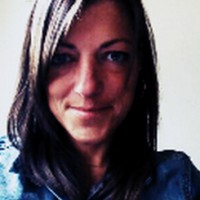I hadn’t stopped moving in two years.
Slight exaggeration, perhaps, but there is some truth to it: in the last two-and-a-bit years since getting sober, I have always had a multitude of things going on.
I say this not to boast, because I have recently come to the realization that this constant need to fill my time, to work two jobs (why not three?) and attend full time school and volunteer at every opportunity and attend every free event in town and try all the new recipes and read all the self-help books and attend 12-step meetings and therapy and train for a road race and learn to play the guitar and make sure my son has home-baked goodies in his lunch every day and go to yoga and journal and plan meaningful, bonding-filled nights with my spouse, and so on, all at once—is a sickness. A disease. An addiction.
I, who have run the gamut with disordered eating, dealt with depression and anxiety for two decades, and spent years self-medicating—and self destructing—with alcohol, perhaps should have come to this conclusion a little sooner.
Instead, I thought doing all the things I could possibly fit into a day meant I was doing incredibly well. Certainly, and I believe this is very common for recovering addicts, I wished to make up for lost time, deeply saddened over the years I had spent not present in my life or my loved one’s lives.
My ever-patient partner pointed it out, several times. I didn’t need to be this busy, he suggested—he even went so far as to say he missed me being around. My mother and sister pondered aloud how I was coping with so much at once. My best friend kept saying she was concerned about me. I took each of these as signs of my continued success. Because that’s what a highly successful person does, right? They accomplish everything they set out to do, keep everyone happy, and look good while doing so. Right?
First, I got sick. I caught a flu I couldn’t shake, and ended up in the hospital on IV fluids and electrolytes. Not a big deal, at all, but missing one evening and morning out of my busy schedule threw me into such a panic (a legitimate panic, too, as I had committed myself to so many things it was impossible to take time out) that I realized I needed to take a look at my life.
I didn’t pause to take that look, though, and jumped right back into the heart of things, neglecting to notice another giant red flag, flapping noisily in the breeze, desperately trying to catch my attention: my near constant irritability. Annoying sounds, the children’s behaviour, other drivers, the way my partner twitches his feet when he gets tired; I had zero patience for any of it, and it showed, painfully, in my relationships and interactions. In my yoga practice. In my emails. My short-tempered new self was ever-prevalent in my quick, snappish responses to nearly everything.
Finally, one of my jobs cut a bunch of hours, and being a newer staff member I was one of the first to lose shifts. My first instinct, of course, was to scramble for another job. But this time, something—fatigue, perhaps—made me pause and reconsider. Maybe a small break from doing so much was just what I needed to figure out what exactly was going on in my small, insulated world.
I booked a weekend off of work, and out of town with my partner. Away from children and regular commitments, I was forced to sit with myself. Just me, and my thoughts. I had an epiphany, of sorts, that weekend, and I imagine that many of those who struggle with the “busy syndrome” can relate.
I was avoiding things by being busy. Emotions, people, conversations.
I was avoiding feeling.
I was sad.
My epiphany revealed that my constant search for more, more, more to achieve and accomplish was a cover-up. I most definitely love having a lot of things on the go—I’m interested in life, in living every day to the fullest, and in setting goals and achieving them. But I was dead-set on overkill—too much of absolutely everything, all the time, so that I never had to sit for a moment with my feelings.
I have things to work through, as we all do. I have a long way to go—it is still ingrained in my system to take on as many things as I can at once. But, day by day, I am attempting to slow down.
I’ve realized it’s alright, too, to not have a band-aid for this one. To just let it be. Whether it is regret from my past that has caused the grief, or exhaustion, or depression: I think it’s simply enough to just let it be sadness, and not concern myself with the cause, or with a quick fix.
Perhaps you recognize yourself in my behaviour. Or you have been there, and come out the other side, peaceful like the Buddha, lacking the need to fill every second. I cannot say I am remotely Buddha-like, or that I have changed completely in my constant searching for more to do, but I’m beginning to learn how to sit with the feelings, every day.
Part of growth is recognizing the importance of the baby-steps, the inches moved forward into freedom.
As I write this, I’m sitting outside, alone, in my backyard. When I finish typing I will close my computer and be just fine with not doing anything for a few moments. I will let the feelings wash over me, knowing that whatever discomfort they bring, like everything on this earth, is temporary and fleeting.
I will be still, and at peace, and that is progress.
Relephant Read:
The Battle Against Busy.
Author: Keeley Milne
Images: Moyan Brenn/Flickr, Benjamin Combs/Unsplash
Editor: Emily Bartran











Read 0 comments and reply